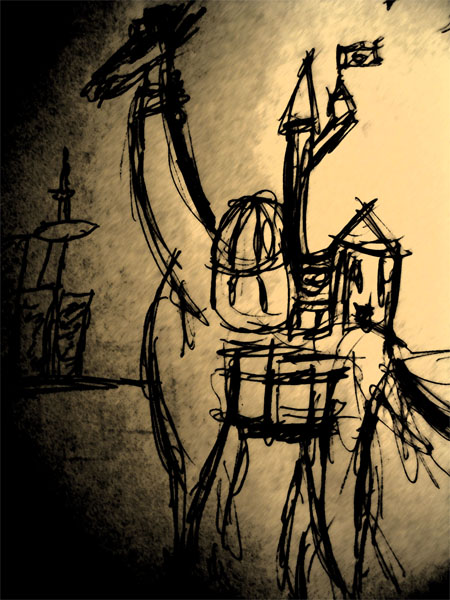Invent-a-Micronation: Contest Results
 [Image: Utopia, one of the world's most famous micronations, a speculative city of canals and well-ordered churchyards; via Wikipedia].
[Image: Utopia, one of the world's most famous micronations, a speculative city of canals and well-ordered churchyards; via Wikipedia].BLDGBLOG's Invent-a-Micronation contest came to a fiery end last night, and there were some great entries. I've chosen a winner (revealed at the end of this post), but I've also decided to give brief rhetorical tours of several of the other ideas. So read on, micronationalists – and, in the process, remember to check out BLDGBLOG's earlier interview with Simon Sellars, co-author of The Lonely Planet Guide to Micronations; be sure to buy a few copies of the book for everyone you know; and enjoy.
The micronational tour now begins...
Anne Ehrlich's micronation would consist of "a bunch of people who want to live together, and display all their personal belongings on tables." Specificity, after all, is the root of micronationalism. Everyone in Ehrlich's world will sleep in "a giant mezzanine communal bed," and there will be "no cupboards, drawers, wardrobes, safes, or other enclosing storage type devices." The whole thing "would look quite a bit like the Vancouver flea market" (minus the communal bed).
Hannah Holden, meanwhile, suggests finding "an island locale, requiring no specific latitude." The requirements of citizenship would include "lack of annoying and/or boring behaviour." The micronation itself would achieve energy independence through "the use of wind, sun, and wave power," which "will be exported if possible."
Jesse Lewis emailed to describe the "Most Serene Republic of Anacanapana." Anacanapana's "territory is made up of Ephemeral Autonomous Regions – each EAR is a 5'5" radius encircling each citizen (this distance was chosen based on the height of the Eternal President)."
Thus, "as citizens move about, the territory of Anacanapana moves as well."
Then there is Alphistia, submitted by Tony Skaggs. "At the moment," Skaggs writes, Alphistia "does not claim territory, a house, or a condo... but it does exist. I created it when I was a 9 year old boy in Kentucky." Alphistia even has its own newspaper, the Alphistian Times, as well as a capital city called Enteve.
 [Image: A MetroTram map of Enteve, the capital of Alphistia; diagrammed by Johannes Bouchain, at his fascinating site Stadtkreation].
[Image: A MetroTram map of Enteve, the capital of Alphistia; diagrammed by Johannes Bouchain, at his fascinating site Stadtkreation]."Alphistia is a country in search of both land and people," Skaggs tells us. "All the territory in the world is today claimed by nation states, although new countries have been formed or proclaimed in recent years, peacefully or not. Existing nations are jealous of their territory, no matter how small, but Alphistia would only come into existence by peaceful means. The challenges are great for a new-country project such as Alphistia, and this fact is acknowledged and accepted."
Indeed, he concludes: "The creation of new land from the sea will also be explored as a solution."

 [Images: Enteve, the capital of Alphistia; the Alphistian postage stamp, printed by "a guy in Berlin who prints really professional looking stamps." Map and stamp designed by Tony Skaggs].
[Images: Enteve, the capital of Alphistia; the Alphistian postage stamp, printed by "a guy in Berlin who prints really professional looking stamps." Map and stamp designed by Tony Skaggs].Fellow Los Angeleno "Atom Debris" jumped in early with his Sovereign Dictatorship of MOB, "a nation whose territory consists of the body and personal property of M Otis Beard." The state's Constitution includes a provision that, should Dictator Beard ever find himself unconscious "for reasons other than normal sleep, my appointed medical personnel may rule as my Regents until such time as I regain consciousness."
But who would stop them from secretly inducing a permanent coma...? A coma-d'état, as it were.
I was then quite pleased to receive an email from legendary link-smith cenoxo, who proposed an old Peter Sellers film – The Mouse That Roared – as the model for a future micronation: "Could there ever be a more capable triumvirate than Peter Sellers as Prime Minister, General, and Duchess?" cenoxo asks. His submission ends with a piece of cautionary advice "about snatching defeat from the jaws of victory: do not acquire any weapons of mass destruction that we happen to stumble across."
Anamoglam, aka Dave Walen, suggests "[s]titching together the leftover ships of yesterday, to build the floating island of my shipwrecked maritime micronation"; this will be "Archigram meets Waterworld," he writes. August Chesser instructed us to "[i]magine a great mass of yellow fluffy residences foaming up from the ground," with "passageways framed by biological sculpture and petrochemical technology." Along similarly imaginative lines, Hugo Bowne-Anderson mapped out a world of geological novelty, where "elements carve your continuous city out of the earthy crust" itself; and Eric Hunting suggested a micronation called Aquina, "an equatorial marine settlement on a pneumatically stabilized platform composed of nanofiber reinforced geopolymer cement." Aquina would be constructed with "a flowing terraced structure akin to the mountain farms of Indonesia."
And now we end with two of my favorites – one of whom is the winner.
An excellent and inspired idea, one that could very easily be developed into an entire series of animated films, came to us from Julian Smith. Smith's "city-state of Flotsam (pop. 189) is built upon the back of a gargantuan giraffe named Twiga."
 [Image: Julian Smith].
[Image: Julian Smith]."She walks the wide, open spaces of the world," Smith explains, "from the Mongolian steppes to the Canadian tundra. The Flotsam aristocracy inhabit the marble domes and towers piled along Twiga’s spine, while the indentured servants are quartered in lighter, wooden structures that hang against her flanks like panniers. A funicular runs up her neck to her head, where the crow’s nest and cartographic lab are located. In Flotsam, maps are redrawn hourly as the landscape changes, with the city itself always at the centre."
The winner, though, is Carl Douglas, a member of the so-called Barricades Commission, who sent in three fantastic images. "We have barricaded ourselves in a disused quarter of your city," he writes. "Join us."


 [Images: Carl Douglas].
[Images: Carl Douglas].Douglas proposed an urban micronation made of reclaimed and barricaded space; constructed from permanently borrowed architectural materials, it would take shape from the wreckage of a world it helps dismantle: "Liberate precast slabs! Gather beams and planks! Borrow bricks! Tear up your carpets! Upturn your vehicles! Fill gaps with shopping trolleys! Steal a crane!"
So congratulations, Carl – your free copy of The Lonely Planet Guide to Micronations should be on its way to you soon; and BLDGBLOG owes a huge thank you to everyone involved – if your micronations make any headway, be sure to keep in touch...





Comments are moderated.
If it's not spam, it will appear here shortly!
Ooh, well done! Congratulations to the founders of Reclamation Nation, and kudos to all those with wierd and wonderful ideas (ahem, realities)!
One question for all the winners: how many of these nations recognise shared citizenships?
"how many of these nations recognise shared citizenships?" Alphistia would, but it depends on the person -- do they feel Alphistian? The manifesto explains what that is: http://www.alphistia.com/manifesto1.html. email is alphistia@yahoo.com.
The winning entry was compelling. I see a lot of sentiment and sensibility here common to the old Urban Nomad movement of the 1960s and 70s which, though largely forgotten now, seems to have many of its ideas and ideals re-emerging today as we move inexorably (and unfortunately obliviously) toward a post-industrial culture. The notion of spontaneously re-appropriating a kind of social soverignty in the midst of an increasingly anti-social dominant culture is intririguing -though hazardous in a world where governments are such increasingly jeleaous and insecure gods. (the troubled histories of communities like Christiana and the tragic histories of so many attempted marine colonies are plain enough -inspiring Robert Zubrin's famous comment that these days one has to go as far as Mars to get away from the cops...
It's too bad Dave Walen had to steal his idea wholesale from China Mieville's floating city, Armada (featured in his book "The Scar".)
I thought it was a cool idea too, but I guess I wouldn't have the balls to submit it to a contest. :/
To the Barricades, then!
But once our buildings are arrayed in Bristol fashion, let us hoist the Crimson flag and embark upon our imperial destiny.
As a footnote to the idea of a National Sex Garden, the Lovely Park di Bari may be the first instance of implementation. Fitting that it's in Italy. [Libero]
Post a Comment